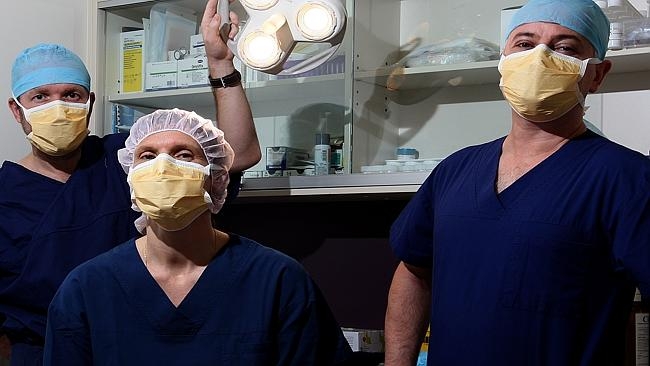
Surgeons fear retribution from Queensland Health over pay contract dispute #qldpol #smoqld #keepourdoctors
THEY’RE not afraid to open up someone’s chest or skull and do surgery. But the Newman Government has them so scared, they’re too afraid to show their faces in the fight for Queensland’s health system.
Three Queensland Health specialists spoke to The Sunday Mail about the contracts stoush between doctors and the Newman Government, but were so worried about being identified, they agreed to talk only on a guarantee of anonymity.
Others approached by the paper were too scared to talk for fear of retribution by Queensland’s health hierarchy.
None of these three are spokespeople or union figures, but highly qualified specialists committed to the public health system.
They say it’s not about the money, and never has been. They’re not against individual contracts, being accountable or finding savings. But they are passionately opposed to accountants and managers taking over the treatment and care of their patients.
They’re also opposed to the government shifting the goalposts and being able to sack them if they blow a budget or speak up for patients.
Despite government efforts to spin the dispute as greedy, fat-cat doctors holding out for more pay, all three said money and entitlements were irrelevant. If they were in it for the money, they’d up their hours in private practice. The stand-off is all about patient care, patient safety and doctors’ ability to advocate for them. And if doctors do walk en masse, it’s about the future of Queensland healthcare.
Marcus (not his real name), an intensive care specialist and full-time senior medical officer (SMO) in the public health system for 10 years, said the contracts meant key decisions about treatment and patient care would be ripped out of their hands and handed to managersand accountants.
“The whole tone of the contracts is giving management unfettered influence over patient treatment,” he said. “That runs the risk of treatment being influenced by not what is best for the patient but for the bottom line, or rather for the performance (targets) of the manager. Yet I wasn’t aware a health system was ever meant to be profitable.”
Marcus said the message within the KPIs was overwhelmingly one of profitability and return on investment.
“I don’t have a problem with KPIs, but if they can be changed without my consent into what management wants, we have a very dangerous situation,” he said.
“Doctors must never allow politics to be put ahead of patients – and that is what seems to be happening.”
Michaela (not her real name) has been a neurosurgeon and full-time SMO in the public sector for five years after training for 10.
As a neurosurgeon, she has the option of switching to more lucrative private work and so has signed a resignation letter – as have many colleaguesfrom her department.
“If the contracts come in in anything like their current form, I cannot work in the public system,” Michaela said. “My concern (about the new contracts) is the ability of the employer to change rosters or place of work, and the prospect of termination in a case where you’re deemed to have affected the financial profitability in your unit.”
Michaela said the prospect of an exodus from neurosurgery would be catastrophic for healthcare and health education in Queensland, and that the expertise in the department could not be replaced from within Australia.
With the prospect of a massive loss of staff, the usually conservative and circumspect Royal Australasian College of Surgeons has weighed in to the debate, predicting Queensland’s health system will “take many years to recover” from a walkout.
Cameron (not his real name), a cardiologist and SMO for 12 years’ experience, said his greatest concern was the power of the bureaucracy to sack doctors who spoke out for their patients.
“There’s an essential need for us to advocate for patients, be able to deliver better care and develop services,” he said. “Clinicians can only do that effectively if they don’t fear they’re putting their career on the line.”
Cameron said most doctors accepted budget pressures and the need to adapt. But that could only happen in an environment of trust and mutual respect.
Source and public comments: The Sunday Mail
